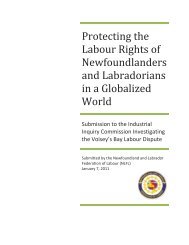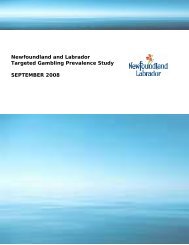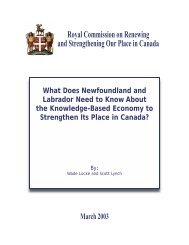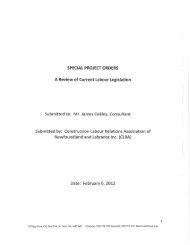Energy Plan - Government of Newfoundland and Labrador
Energy Plan - Government of Newfoundland and Labrador
Energy Plan - Government of Newfoundland and Labrador
Create successful ePaper yourself
Turn your PDF publications into a flip-book with our unique Google optimized e-Paper software.
The province is also home to the Centre for Marine Compressed Natural Gas<br />
(CNG), the world’s first research <strong>and</strong> development centre for large-scale CNG<br />
transportation. We have a large natural gas resource in a challenging ocean<br />
environment <strong>and</strong> successful development <strong>of</strong> CNG technology will provide a<br />
valuable new alternative for transporting this gas to market. The Provincial<br />
<strong>Government</strong> was a founding member <strong>of</strong> the Centre <strong>and</strong> continues to support<br />
its work.<br />
We are also a partner in Petroleum Research Atlantic Canada (PRAC). PRAC is<br />
a partnership amongst industry, governments <strong>and</strong> academia created to build<br />
regional petroleum–related research <strong>and</strong> development capacity. This approach<br />
shows how we can work together to grow the industry. The Provincial <strong>Government</strong><br />
is providing $100,000 in funding to PRAC in each <strong>of</strong> the next three years.<br />
While these research <strong>and</strong> development facilities <strong>and</strong> partnerships provide us with<br />
a solid foundation <strong>and</strong> a record <strong>of</strong> achievement, we still face some innovation<br />
challenges. These include limited human resources in some critical areas,<br />
limited access to private-sector financing for commercialization, a reliance on<br />
primary resources in rural areas <strong>and</strong> a variety <strong>of</strong> geographic challenges.<br />
There has been significant research <strong>and</strong> development in the provincial energy<br />
sector, particularly in the petroleum sector. There are significant opportunities<br />
to increase expenditures in this area. The Atlantic Accord legislation provides<br />
for spending on research <strong>and</strong> development <strong>and</strong> authorizes the C-NLOPB to issue<br />
guidelines with respect to such spending. These guidelines are expected to<br />
result in oil companies spending several million dollars per year on research <strong>and</strong><br />
development in the province. This additional spending will further increase the<br />
province’s stature as a location for energy-related research <strong>and</strong> development in<br />
areas where we have or can build a competitive advantage.<br />
The Provincial <strong>Government</strong> has already begun to address these challenges, with<br />
the release <strong>of</strong> the Innovation Strategy in 2006. In April 2007, the Provincial<br />
<strong>Government</strong> announced the development <strong>of</strong> a province-wide, comprehensive<br />
research <strong>and</strong> development strategy <strong>and</strong> the establishment <strong>of</strong> a Research <strong>and</strong><br />
Development Council. The Provincial <strong>Government</strong>, in collaboration with Memorial<br />
University, College <strong>of</strong> the North Atlantic <strong>and</strong> the private sector, will develop a<br />
strategy to give <strong>Newfoundl<strong>and</strong></strong> <strong>and</strong> <strong>Labrador</strong> a competitive edge in various<br />
sectors such as ocean technology <strong>and</strong> alternative energy technologies. Under<br />
this strategy, the Provincial <strong>Government</strong> aims to increase private <strong>and</strong> public<br />
sector research capacity <strong>and</strong> enhance the provincial research <strong>and</strong> innovation<br />
environment.<br />
68

















